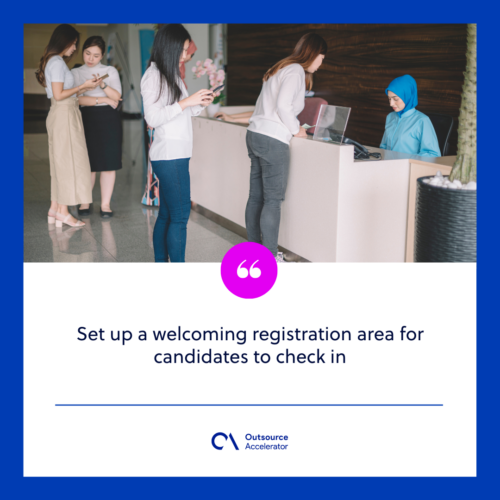Leveraging the power of a walk-in interview for better hires

Finding the right employees to fill vacant positions in your organization can be a challenge. Companies constantly seek innovative ways to attract top talents and streamline their hiring process.
However, relying on time-tested methods to get better hires faster can still be wise for companies. One of these reliable recruitment methods is the walk-in interview.
Read on to learn how conducting a walk-in interview can benefit your organization and the best ways to conduct them.
What is a walk-in interview?
A walk-in interview is an employment screening process wherein applicants can directly go to a company’s premises without setting up appointments.
Unlike other screening methods, such as phone calls or emails, a walk-in interview lets candidates present themselves spontaneously and showcase their skills in person.
Walk-in applicants may be subjected to initial screenings or mini-interviews to assess their suitability for the role they are applying for.
Conducting a walk-in interview is beneficial to both job seekers and recruiters. It allows applicants to attend the interview without preparations or planning. On the flip side, it lets recruiters efficiently evaluate a larger pool of applicants in a shorter period.
For this reason, the walk-in interview method has gained popularity among employers as a dynamic and effective talent acquisition method.

Walk-in interview vs. Scheduled interview
Another popular way of conducting job screenings is through scheduled interviews.
In contrast to a walk-in interview, scheduled interviews require applicants to show up at a predetermined time and date.
Aside from the need to show up on time, there are other differences between a scheduled and walk-in interview.
The tables below show how the two interview methods differ.
| Scheduling | |
| Walk-in interview | Scheduled interview |
|
|
| Flexibility | |
| Walk-in interview | Scheduled interview |
|
|
| Time efficiency | |
| Walk-in interview | Scheduled interview |
|
|
| Candidate pool | |
| Walk-in interview | Scheduled interview |
|
|
Advantages of accommodating a walk-in interview
A walk-in interview is not beneficial to just the applicants. This recruitment method also brings several benefits to employers as well.
Some of the advantages of allowing a walk-in interview include:
Efficient screening of applicants
A walk-in interview allows employers to process more applicants in less time. Since candidates show up without prior appointments, initial screenings can be conducted quickly.
Walk in job interview also facilitate on the spot interviews, enabling recruiters to gauge candidates’ skills and suitability firsthand.
It helps employers identify potential matches for the job requirements swiftly.
Cost-effective recruitment
Conducting a walk-in interview instead of scheduled ones eliminates the need for lengthy pre-screening procedures. Shorter recruitment cycles translate to lower overall recruitment costs.
One of its key benefits is cost-effective recruitment. Walk-in interviews allow the hiring manager to assess potential candidates efficiently without the need for extensive scheduling and planning.
Unlike traditional interviews that may take weeks to coordinate, this type of job interview streamlines the process, saving time and resources.
Creating positive candidate experience
A walk-in interview provides candidates with a convenient and accessible way to engage with companies.
Even if they are not selected, a positive experience can encourage them to consider future opportunities with the company or recommend it to others. This further enhances the employer’s brand image.
How to best handle a walk-in interviews
Handling a walk-in interview requires careful planning and execution to ensure a positive and efficient experience for the company and the candidates.
Below are some actionable advice to help you skillfully pull off a successful walk-in interview:
Preparation is key
Before the walk-in interview event, ensure all necessary preparations are in place. Train the interviewers on the evaluation process and the key criteria for assessing candidates.
Have all interview materials, such as evaluation forms and candidate sign-in sheets, ready in advance.
Even if you didn’t have a prior appointment, treat the opportunity with the same level of professionalism as a scheduled interview.
Remember, even in fast-paced settings, your preparation can help you shine during job interviews.
Create a welcoming environment
Set up a welcoming registration area for candidates to check in. Provide clear instructions on the interview process and any necessary paperwork they need to complete upon arrival.
Friendly staff or volunteers can assist candidates and create a positive first impression of your company.

Know your job requirements
Clearly define the roles and qualifications you are looking for in candidates. This will help you quickly identify suitable candidates during the initial screening process.
You should also be prepared to ask relevant questions to assess candidates’ skills and experience accurately.
Utilizing opportunities like career fairs to network and gather information can provide valuable insights into the company and the role.
It is also beneficial to familiarize yourself with the hiring managers’ preferences during the entire hiring process.
While interacting with interested candidates, showcasing your professionalism and positive attitude can leave a lasting impression on the interviewers.







 Independent
Independent




